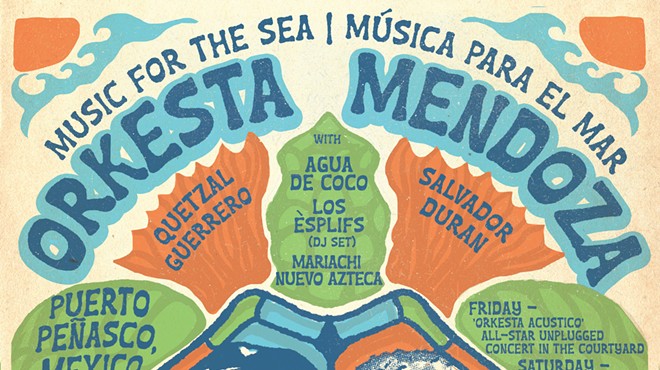Thursday, November 1, 2012
Fear and Loathing at MOCA Tonight
Tucson's Museum of Contemporary Art wraps up this year's book club—Fear and Loathing on the Campaign Trail ’12—with a discussion of Fear and Loathing on the Campaign Trail ’72, moderated by yours truly, Tucson Weekly senior writer Jim Nintzel.
It all goes down at 5:30 p.m. at MOCA. You can find the details here, but as for the important stuff: Yes, there will be beer and wine.
I first read Hunter S. Thompson's 1972 campaign dispatches back in 1983, when I was in Mr. Albertson's government class at Rincon High. (I scored high enough on an initial civics quiz that Mr. Albertson, in his infinite wisdom, felt it would be waste of time for me to sit in class with everyone else, so he sent me off to the library to read books about government and produce reports. Fear and Loathing was first on my list. How I got away with that is one of the great mysteries of my life.)
I'm left with a number of impressions as I've re-read it all these years later, some of which we'll dig into this evening. To wit: In a historical context, HST's observations rolled back the curtain on what campaigning like no one else; it must have been deeply weird to watch these dispatches unfold in the pages of Rolling Stone (which itself was a youngster in those days); running for president has changed a lot in the last 40 years; HST had a lot of filler and digressions in these articles (but it's great filler and digression); and I sure wish I could read Hunter's impressions of Campaign 2012. It's just a delight to read the words that poured out of him.
Matt Taibbi has a wonderful introduction in the 40th anniversary edition of the book that was reprinted in part in Slate a few months back. An insightful excerpt:
People who describe Thompson’s dark and profane jokes as “cynical humor” don’t get it. Hunter Thompson was always the polar opposite of a cynic. A cynic, in the landscape of Campaign Trail ’72, for instance, is someone like Nixon or Ed Muskie, someone who cheerfully accepts the fundamental dishonesty of the American political process and is able to calmly deal with it on those terms, without horror.
But Thompson couldn’t accept any of it. This book buzzes throughout with genuine surprise and outrage that people could swallow wholesale bogus marketing formulations like “the ideal centrist candidate,” or could pull a lever for Nixon, a “Barbie-Doll president, with his box-full of Barbie Doll children.” Even at the very end of the book, when McGovern’s cause was so obviously lost, Thompson’s hope and belief still far outweighed his rational calculation, as he predicted a mere 5.5 percent margin of victory for the Evil One (it turned out to be a 23 percent landslide for Nixon).
When I read this book now, it reminds me a lot more of vast comic epics like The Castle or The Trial than one of Fear and Loathing’s smart nonfiction thematic contemporaries (like the excellent The Selling of the President, 1968, for instance). Just like Kafka’s Land Surveyor, Hunter in Campaign Trail ’72 enters a nightmarish maze of deceptions and prevarications and proceeds to throw open every door—bursting into every room with a circus clown’s theatrical self-importance and impeccably bad timing—searching every nook and cranny for the great Answer, for Justice.
What makes the story so painful, and so painfully funny, is that Hunter chooses the presidential campaign, of all places, to conduct this hopeless search for truth and justice. It’s probably worse now than it was in Hunter’s day, but the American presidential campaign is the last place in the world a sane man would go in search of anything like honesty. It may be the most fake place on earth.
Both now and in Thompson’s day, most of the press figures we lionize as great pundits and commentators seem to think it’s proper to mute our expectations for public figures. We’re constantly told that politicians should be given credit for being “realistic” (in the mouths of people like David Brooks, “realistic” is really code for “being willing to sell out your constituents in order to get elected”) and that demanding “purity” from our leaders is somehow immature (Hillary had to vote for the Iraq war; otherwise she would have ruined her presidential chances!).
To me, the reason so many pundits and politicians take this stance is because the alternative is so painful: If you cling to hope and belief, the distance between the ideal and the corrupt reality is so great, it’s just too much for most normal people to handle. So they make peace with the lie, rather than drive themselves crazy worrying about how insanely horrible and ridiculous things really are.
But Thompson never made that calculation. He never stooped to trying to sell us on stupidities about “electability” and “realism,” or the pitfalls of “purity.” Instead, he stared right into the flaming-hot sun of shameless lies and cynical horseshit that is our politics, and he described exactly what he saw—probably at serious cost to his own mental health, but the benefit to us was Fear and Loathing on the Campaign Trail ’72.
We can easily imagine how Hunter would have described people like Mitt Romney (I’m guessing he would have reached for “depraved scumsucking whore” pretty early in his coverage) and Rick Santorum (“screeching rectum-faced celibate”?), and all you have to do is look at his write-up of the Eagleton affair to see how this writer would have responded to whatever manufactured noncontroversy of the Bill Ayers/Reverend Wright genus ends up rocking the 2012 election season.















